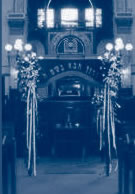|
SEDRA : Shemot: Hertz Chumash p. 206 Exodus
Chap. 1 v. 1
This week's Sedra is generously sponsored by Leon Serry.
SYNOPSIS:
The names of the sons of Israel who came to Egypt are listed.
The total number of Jacob's family was seventy.
After the death of Joseph the Israelites had become exceedingly
numerous and powerful.
A new Pharaoh who ostensibly "did not know Joseph"
(sic) initiated a policy of oppression by reducing the Israelites
to slavery. Under the supervision of cruel taskmasters the
Israelites were forced to build the cities of Pithom and Rameses
on Egypt's frontier as produce storage centres. Pharaoh's
plans to weaken them proved ineffective and he ordered the
Hebrew midwives to kill all male Israelite children at birth,
but, fearing G-d, the midwives disobeyed him. Thereupon, Pharaoh
decreed that every newborn son should be drowned in the river
Nile.
Amram and Yocheved of the tribe of Levi had two children,
Miriam and Aaron. Soon after Pharaoh's edict a second son
was born. After hiding the baby for three months, his mother
made him a basket of bulrushe, lined it with pitch and placed
him among the reeds on the banks of the river Nile leaving
Miriam to guard it at a distance. Pharaoh's daughter came
down to bathe, saw the ark and sent one of her maidens to
fetch it. She realised that it was a Hebrew child and, touched
with pity, decided to adopt it and named him Moses ("drawn
out of the water"). Miriam came forward and, with the
Princess's permission to find a wet nurse, brought the child
back to his real mother under whose care the boy was nurtured
and taught the traditions of his ancestors. When he grew older,
he was taken to the palace.
When he reached manhood, Moses went to see how his fellow
Israelites were faring and saw an Egyptian overseer beating
one of the Hebrews. Looking around to see that no one was
present, he killed the Egyptian and buried his body in the
sand. The next day, he intervened in a quarrel between two
of his own people, Israelites, and the wrong-doer taunted
as to what right Moses had to assume authority and made reference
to the killing of the Egyptian overseer.
When Pharaoh heard of the incident, he sought to kill Moses
who fled to Midian. Moses reached a well where he defended
the seven daughters of Jethro, the priest of Midian, whom
some shepherds were preventing from watering their flocks.
Moses was welcomed by their father, stayed with him whilst
tending his sheep and married his daughter, Zipporah. They
had two sons, Gershom and Eliezer.
During Moses' stay in Midian, Pharaoh died but the oppression
continued with even greater severity under his successor and
the people cried out to G-d. Whilst tending Jethro's sheep
at Horeb, Moses saw a bizarre sight - a bush covered in flames
yet not consumed. He turned aside to gaze at this wonder,
and G-d addressed him commanding him to remove his shoes for
the ground was holy. Moses was to be His messenger to bring
the Israelites out of Egypt and lead them to the Promised
Land. Moses pleaded that he was unworthy but was assured that
G-d would be with him and that, after their deliverance, the
Israelites would worship Him at this very mountain. What reply
was he to give the Israelites, requested Moses, when they
asked for His name ? G-d thereupon revealed Himself as "I
am that I am!" Moses was to tell the elders of Israel
of G-d's revelation and together they were to demand of Pharaoh
that he allow the people to take a three day journey into
the wilderness to sacrifice to G-d. Pharaoh would refuse but,
after he had been smitten by G-d's wonders, the Israelites
would leave Egypt laden with precious gifts.
Moses still protested that the people would not believe him
whereupon he was given the power to perform three miraculous
signs: his rod would turn into a serpent and then resume its
original form; when withdrawn from his bosom, his hand was
leprous but healed completely when the action was repeated;
as a third sign, if the Israelites remained still unconvinced,
Moses was to turn water into blood. Still hesitating and referring
to his defective speech, G-d angrily told him that Aaron his
brother would be his spokesman, and would be genuinely delighted
to go out to meet him on his return journey.
On the return to Egypt Moses was met by Aaron to whom he
related all that had occurred. On reaching Egypt, Aaron, as
the spokesman of Moses, told the assembled elders the words
of G-d and Moses performed the signs before all the people.
They believed that G-d had seen their affliction and all bowed
down in worship before Him.
Moses and Aaron came to Pharaoh and requested him to let
the people go and hold a feast to G-d in the wilderness. Not
only did Pharaoh refuse, but he imposed even harsher measures
on the people. They were no longer to be supplied with straw
(which held the clay together) but the same quota of bricks
was to be produced daily. The Hebrew foremen were flogged
because they could not induce the Israelites to perform such
an impossible task, but their appeal to the King was rejected.
They turned on Moses and Aaron accusing them of making them
odious before Pharaoh.
In reply to Moses' complaint that his mission had failed,
G-d assured him that Pharaoh would be compelled by His might
to let the people go.
HAPHTORAH : Hertz Chumash P. 225
Egyptian bondage finds its parallel in Assyrian domination
in the time of Isaiah, more particularly in the loss of the
10 tribes of the Northern Kingdom in 721 BCE. As Egypt was
ultimately punished for its crimes against Israel, so too
would Assyria suffer retribution. A time will eventually come
when : "they ... that were lost in the land of Assyria,
and they that were dispersed in the land of Egypt ... shall
worship the Lord at the Holy Mountain in Jerusalem".
TELL ME RABBI ... PRAYER FOR THE NEW MONTH:
This prayer, opening with what was originally the private
intercession of the Talmudic Sage Rav, at the end of the daily
Amidah, contains another unique feature. In pleading for the
ingathering of our exiles from the four corners of the earth
there occurs the sole usage in the prayer book of the well-known
phrase Chaverim Kol Yisrael ("All Israel are members
of one united fellowship"), a phrase itself derived in
the Jerusalem Talmud from the verse "Jerusalem is built
as a city which is united (shechubrah) together" (Ps
122:3) - that is, "a city which makes all Israel into
Chaverim".
The phrase may well be an allusion to the hope of reverting
from the present calculation of the Jewish calendar introduced
by Hillel 2 early in the 4th century to its previous determination
by observing the moon's phases. The change can only be effected
in Jerusalem on the restoration of the Sanhedrin and its proclamation
of Rosh Chodesh, which in turn depends on all scholars in
the Holy Land being "united" as Chaverim in re-establishing
the ancient line of rabbinic authority (Maimonides). (Singer's
Siddur 1990 ed.)
"Shabbat Shalom" is generously sponsored by Rosetta
and Nathan Baron
BACK TO SHABBAT SHALOM
TABLE
|








